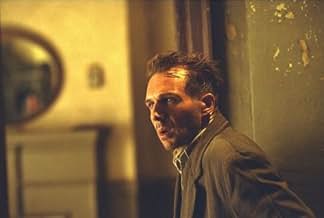NOTE IMDb
6,7/10
42 k
MA NOTE
Un homme souffrant de troubles mentaux s'installe dans une maison de transition. Son esprit retombe progressivement dans le monde créé par sa maladie, où il rejoue un épisode clé de son enfa... Tout lireUn homme souffrant de troubles mentaux s'installe dans une maison de transition. Son esprit retombe progressivement dans le monde créé par sa maladie, où il rejoue un épisode clé de son enfance.Un homme souffrant de troubles mentaux s'installe dans une maison de transition. Son esprit retombe progressivement dans le monde créé par sa maladie, où il rejoue un épisode clé de son enfance.
- Récompenses
- 13 victoires et 25 nominations au total
Histoire
Le saviez-vous
- AnecdotesDavid Cronenberg received the screenplay from Patrick McGrath out of the blue, with a note attached saying that Ralph Fiennes was interested in playing the part of Spider. After about four pages, Cronenberg had decided that he wanted to do the film.
- GaffesCamera is reflected in broken window of asylum.
- ConnexionsFeatured in SexTV: Dark Desires: Sexuality in the Horror Film (2003)
Commentaire à la une
David Cronenberg's film, based on a novel adapted by its author, Patrick McGrath, is set in London in the late 1980's, and explores the effects of an infamous Conservative government policy, whereby expensive, outdated mental hospitals were streamlined and the inmates released with limited supervision, a process that was termed Care in the Community. The film focuses on Spider, an elusive mental patient, institutionalised for most of his life, now released and returned back to a halfway house in East London, the place of his childhood, to fend for himself in the outside world.
This does not look to the uninformed like a Cronenberg film, there being no teleportation, telepathic head-blowing or the like, but once viewed, the film is clearly in Cronenberg's territory. From the beginning of the 1990's, he has seemed to be searching (it seems to me at times desperately) for new subjects in which to explore his morbid fascination. This fascination concerns the consequences of illness. Illness is given outrageous forms in his earlier films, a car accident which debilitates Christopher Walken in The Dead Zone, for instance, one of its effects being morbid clairvoyance. In Spider, Cronenberg focuses on the effect of illness on the brain, with its manifestation in what we would call the real world, when scientists actually view our 'real' world as a simulation made by our brains (and therefore our bodies).
As ever, Cronenberg, unlike other directors, does not condescend and go for the easy option, in other words making Spider a neatly disturbed, good-looking human, glamorised by his tragic sense of unreality, i.e. A Beautiful Mind. Instead, he really explores what it might be like for an intelligent man who tries to make sense of a world and past warped by mental disturbance, and questions his perception and sense of reality. Cronenberg gives Spider pathos and humanity, but never glamorises him.
Ralph Fiennes inhabits Spider naturally and impressively, bringing to the role his consistent qualities of commitment and intensity. The supporting cast is wonderful. Gabriel Byrne plays Spider's father with his rich sourness and Miranda Richardson, in a double role, shows why she is such a hidden, rough gem of British acting (at least to the wider world).
In Spider, Cronenberg Is Back To His Best With A Characteristically Original Film About Society and Mental Illness
This does not look to the uninformed like a Cronenberg film, there being no teleportation, telepathic head-blowing or the like, but once viewed, the film is clearly in Cronenberg's territory. From the beginning of the 1990's, he has seemed to be searching (it seems to me at times desperately) for new subjects in which to explore his morbid fascination. This fascination concerns the consequences of illness. Illness is given outrageous forms in his earlier films, a car accident which debilitates Christopher Walken in The Dead Zone, for instance, one of its effects being morbid clairvoyance. In Spider, Cronenberg focuses on the effect of illness on the brain, with its manifestation in what we would call the real world, when scientists actually view our 'real' world as a simulation made by our brains (and therefore our bodies).
As ever, Cronenberg, unlike other directors, does not condescend and go for the easy option, in other words making Spider a neatly disturbed, good-looking human, glamorised by his tragic sense of unreality, i.e. A Beautiful Mind. Instead, he really explores what it might be like for an intelligent man who tries to make sense of a world and past warped by mental disturbance, and questions his perception and sense of reality. Cronenberg gives Spider pathos and humanity, but never glamorises him.
Ralph Fiennes inhabits Spider naturally and impressively, bringing to the role his consistent qualities of commitment and intensity. The supporting cast is wonderful. Gabriel Byrne plays Spider's father with his rich sourness and Miranda Richardson, in a double role, shows why she is such a hidden, rough gem of British acting (at least to the wider world).
In Spider, Cronenberg Is Back To His Best With A Characteristically Original Film About Society and Mental Illness
- Afzal-s2007
- 21 sept. 2007
- Permalien
Meilleurs choix
Connectez-vous pour évaluer et suivre la liste de favoris afin de recevoir des recommandations personnalisées
- How long is Spider?Alimenté par Alexa
Détails
Box-office
- Budget
- 10 000 000 $US (estimé)
- Montant brut aux États-Unis et au Canada
- 1 642 483 $US
- Week-end de sortie aux États-Unis et au Canada
- 5 575 $US
- 22 déc. 2002
- Montant brut mondial
- 5 808 941 $US
- Durée1 heure 38 minutes
- Couleur
- Mixage
Contribuer à cette page
Suggérer une modification ou ajouter du contenu manquant


























